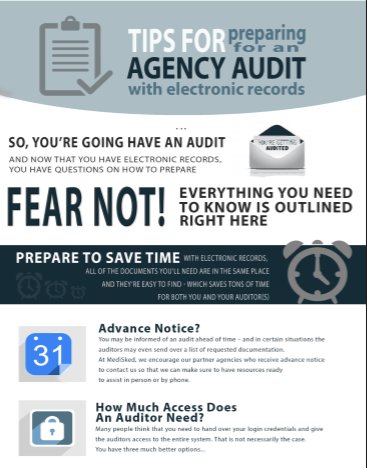Interconnectivity and “smart” devices are everywhere. If your device connects to another source via Bluetooth, and/or syncs to the cloud, you’ve got one. In addition to being ultra-convenient, this connection provides the opportunity for data to be shared. The “Internet of Things” (IoT) is a term for devices that collect and transmit data via the Internet. It’s also the future for collecting data and measuring health, wellness, and other outcomes for people.
Read More
The MediSked Blog
What Does The "Internet of Things" Have To Do With Your Agency's Electronic Records?
Posted by Jean Bezek on Tue, Aug 23, 2016 @ 08:09 AM
The Top 4 Reasons Hospital Software Isn't Right for the I/DD Space
Posted by Elizabeth Chatterton on Mon, Feb 01, 2016 @ 09:06 AM
EMR (Electronic Medical Record) and EHR (Electronic Health Record) systems are great for hospitals and doctors' offices but when it comes to agencies supporting people with intellectual and developmental disabilities, they're almost never the right fit.
Here's why:
1. Provider agencies and medical care facilities are very different places:
EMRs are designed to be used in hospitals and offices, and most of them are sold to be used out-of-the box, without many opporturinties for modification or customization. Providing direct supports is not the same as medical treatment and the kind of records used in hospitals can't capture the entire story (or all of the required documentation) that comes along with supporting a person with a developmental disabiliy.
2. The goal isn't to "discharge" people with I/DD
EMRs follow a workflow that clearly has a beginning, middle and end. Their medical nature has them focused on records management and the creation and documentation of patient assessments and treatment plans. The whole idea is to diagnose the issues, treat the “patient”, and eventually discharge them. In fact, most EMRs include a module called Discharge and Transfer Management.
Programs specifically designed for the I/DD space use a workflow focused on providing a lifetime of services and supports to ensure the health, welfare and safety of the individuals they serve long term. Rather than generating dictations and lab orders, the focus is on goal plans, service notes, and DSP management.
3. When you buy an EMR you get a whole lof of stuff you don't need
Because their needs are so drastically different, provider agencies who have implemented EMR systems intended for the medical world find that the end up with a little bit that's almost what they need - and a whole lot of modules and workflows that have no relevance to them. In some cases, they have even tried to change some of their own processes to fit the system they bought - which is both risky and costly.
4. You're also going to need a whole lot of other software programs
Because EMRs are not designed for provider agencies, they don't bring billable hours, service notes, and pay rates together. You'll still need to manage all of those things and it's unlikely those systems will integrate with one another, which creates a lot of potential for dual-entry and extra work.
There are more reasons for sure - but the ones outlined above are the biggest issues we've seen. If you'd like to see a software platform specifically built for the needs of a provider agency in the I/DD space, make sure to check out MediSked Connect. We may be biased, but we think it does some pretty amazing things.
Tags: EHR
What's the Deal with Meaningful Use & DD Providers?
Posted by Elizabeth Chatterton on Fri, Apr 10, 2015 @ 08:54 AM
Meaningful Use. What’s the deal?
When it comes to DD providers shopping for a certified electronic record solution, we tend to think of it as a dangling carrot.
That money coming back to you seems so in reach as you're making your software decision - but the harsh reality is that most providers never receive reimbursement on their Certified EHRs and EMRs from CMS.
Tags: EHR, Medicaid, Meaningful Use
Easy Audit Prep for DD Agencies Using Electronic Records
Posted by Elizabeth Chatterton on Wed, Apr 01, 2015 @ 05:00 PM





